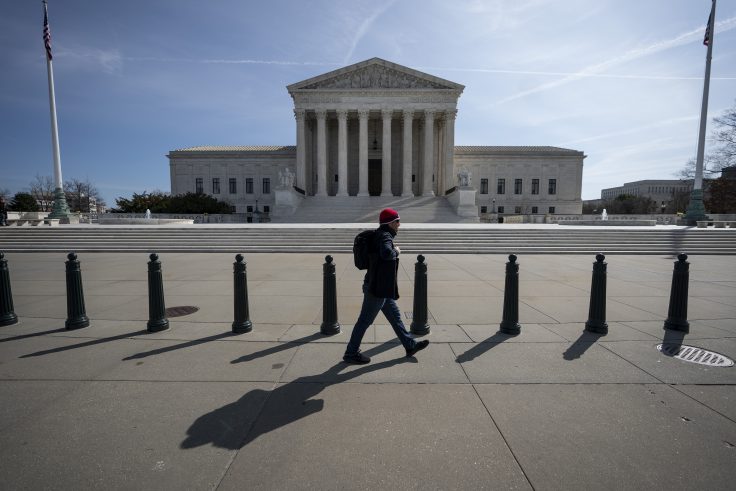U.S. Supreme Court blocks deportation of Venezuelans under wartime statute

The White House stated that President Donald Trump remains committed to his strict immigration enforcement policies.
On Saturday, April 19, 2025, the U.S. Supreme Court temporarily blocked the Trump administration from proceeding with the deportation of a group of Venezuelan migrants accused of gang affiliation.
The deportations were being pursued under an infrequently invoked wartime statute.
Despite the court’s pause, the federal government pressed the justices to overturn the ruling.
The decision came in response to an urgent request from the American Civil Liberties Union (ACLU), which argued that dozens of Venezuelan migrants were at risk of immediate deportation without the opportunity for judicial review—something the Supreme Court had previously ruled should be available.
"The Government is directed not to remove any member of the putative class of detainees from the United States until further order of this Court," the justices said earlier in a brief, unsigned decision.
Conservative Justices Clarence Thomas and Samuel Alito voiced their disagreement with the ruling in a public dissent, issued shortly after midnight at 12:55 a.m. (0455 GMT).
Later that Saturday, the Trump administration submitted a formal response urging the Supreme Court to reject the ACLU’s emergency request on behalf of the Venezuelan migrants once a more thorough review is conducted.
The White House stated that President Donald Trump remains committed to his strict immigration enforcement policies.
However, there was no immediate sign that the administration intended to defy the Supreme Court’s order, avoiding, at least for now, a potential constitutional standoff between the executive and judicial branches.
While the final destination of the Venezuelan migrants remains uncertain, the administration has already deported over 200 individuals from Venezuela and El Salvador, whom it alleges are gang members, to a high-security prison in El Salvador.
Among those deported was Kilmar Abrego Garcia, a Salvadoran national whom the government later acknowledged was mistakenly removed, sparking widespread criticism of its immigration practices.
Attorneys and relatives of several deportees have contested the government’s claims, arguing the migrants were not involved in gangs and were denied any real opportunity to challenge the allegations.
"We are confident in the lawfulness of the Administration’s actions and in ultimately prevailing against an onslaught of meritless litigation brought by radical activists who care more about the rights of terrorist aliens than those of the American people," White House Press Secretary Karoline Leavitt said in a statement
The case has sparked concerns over whether President Trump, who has, at times, demonstrated a readiness to challenge judicial authority since resuming office on January 20, will honor the restrictions imposed by the Supreme Court.
"I'm scared," she recalled her husband telling her.
He had been arrested in Atlanta the previous month.
According to her, the men were initially told they were being taken to El Salvador’s CECOT prison, but the bus unexpectedly turned around after one of the officials received a phone call.
Elected last year on a platform centered around tough immigration enforcement, President Trump invoked the 1798 Alien Enemies Act in an effort to expedite the deportation of individuals alleged to be part of Tren de Aragua—a gang that originated in Venezuelan prisons and has been designated a terrorist organization by his administration.
Trump and his top advisers have maintained that the executive branch holds broad powers over immigration, challenging the traditional balance among the branches of government.
The administration notched a legal win on Friday when an appeals court halted a contempt threat issued by District Judge James Boasberg.
Trump had earlier called for Boasberg’s impeachment after a ruling that went against him, drawing a rare public response from Chief Justice John Roberts in defense of judicial independence.
The deportation of the Venezuelan migrants would mark the first such action following the Supreme Court’s narrow 5–4 ruling that permitted removals under the 1798 Alien Enemies Act.
However, the Court emphasized that deportees must receive sufficient notice "within a reasonable time and in such a manner as will allow them to actually seek habeas relief in the proper venue before such removal occurs."
Habeas corpus is a fundamental legal right in the United States, allowing individuals in custody to challenge the lawfulness of their detention.
While the Supreme Court did not define a specific timeframe for notice, legal advocates across the country have called for at least 30 days' notice to ensure migrants have a fair opportunity to fight their deportation orders.
When asked about the looming deportations on Friday, President Trump said he wasn’t aware of the specific case but added, "If they’re bad people, I would certainly authorize it."
"That’s why I was elected. A judge wasn’t elected," he told reporters at the White House.
